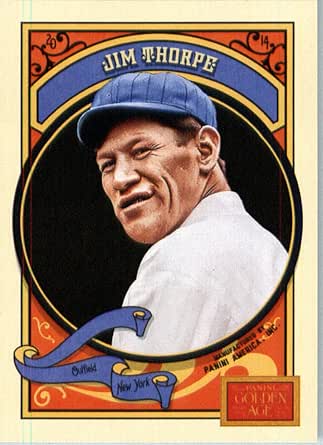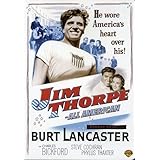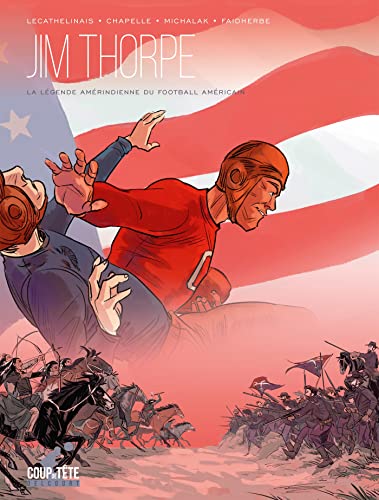Jim Thorpe is a name that resonates deeply within the annals of American sports history, yet the full scope of his life and legacy often remains overshadowed by the triumphs and trials he faced. Rediscovering Jim Thorpe offers not only a glimpse into the life of an extraordinary athlete but also a reflection on the cultural and historical context of the early 20th century. This article will explore his life, achievements, and the legacy he left behind, placing him within the broader tapestry of American history.
The Early Life of Jim Thorpe
Born on May 28, 1887, in Prague, Oklahoma, Jim Thorpe was a member of the Sac and Fox Nation. His early life was marked by hardship, with his parents facing numerous challenges. Despite these obstacles, Thorpe showed exceptional athletic ability from a young age.
A Glimpse into His Childhood
Thorpe’s upbringing was steeped in Native American culture, which played a significant role in shaping his identity and resilience. Key aspects of his childhood include:
- Native American Heritage: Growing up in a Native American community, Thorpe was deeply influenced by the traditions and values of his people.
- Natural Athleticism: From an early age, he excelled in various sports, including running, jumping, and throwing.
- Struggles with Education: Thorpe faced challenges in formal education due to his background, which further fueled his determination to succeed in sports.
Rise to Prominence: The Athlete Emerges

Thorpe’s athletic prowess became evident during his college years at Carlisle Indian School in Pennsylvania, where he excelled in multiple sports. His remarkable versatility set him apart from his peers.
Outstanding College Career
While at Carlisle, Thorpe participated in:
- Track and Field: He won numerous national championships and set records that stood for decades.
- Football: Thorpe played a pivotal role in popularizing the sport, earning accolades and leading his team to victory.
- Baseball and Basketball: His talents were evident across various sports, showcasing his exceptional athletic ability.
Olympic Glory in 1912

Thorpe’s national fame skyrocketed when he participated in the 1912 Stockholm Olympics. Competing in the decathlon and pentathlon, he dominated the events and won two gold medals. However, controversy soon followed.
- Disqualification: Thorpe was stripped of his medals due to a violation of amateurism rules, a decision that sparked outrage and debate.
- Legacy of the Olympics: Despite the disqualification, Thorpe’s achievements in Stockholm solidified his status as one of the greatest athletes of his time.
The Professional Career of Jim Thorpe

Following his Olympic triumph, Thorpe transitioned into professional sports, where he continued to make a significant impact.
Football Superstar
Thorpe played professional football for several teams, including:
- Hupmobile: An early professional football team where he showcased his skills to a broader audience.
- Akron Pros: Thorpe led the team to victory in the first-ever professional football championship in 1920.
- New York Giants: His time with the Giants helped popularize the National Football League (NFL) and solidified his legacy as a football pioneer.
Baseball and Beyond

Thorpe also ventured into baseball, playing for various minor league teams. His impact on sports extended beyond the field, influencing future generations of athletes.
- Minor League Baseball: Thorpe played for the New York Giants in the early 1910s, proving his versatility as an athlete.
- Influence on Future Athletes: Thorpe’s success inspired countless athletes, particularly from Native American backgrounds, to pursue their dreams in sports.
Challenges and Triumphs
Despite his monumental success, Thorpe faced numerous challenges throughout his life, particularly related to his identity and societal perceptions of Native Americans.
Struggles with Identity
Thorpe often grappled with the duality of his identity as both an elite athlete and a Native American. Key challenges included:
- Racial Discrimination: Thorpe faced prejudice and discrimination throughout his career, which impacted his journey and legacy.
- Struggles with Alcoholism: Personal battles with addiction added to the challenges, affecting his relationships and career.
- Financial Hardships: Despite his fame, Thorpe faced financial difficulties later in life, leading to a complex relationship with his legacy.
The Legacy of Jim Thorpe

Thorpe’s legacy extends beyond his achievements in sports. He is celebrated for his contributions to American culture and sportsmanship.
Honoring His Memory

In recent years, efforts have been made to honor Thorpe’s legacy:
- Jim Thorpe, Pennsylvania: The town was named in his honor and serves as a tribute to his legacy.
- Statues and Memorials: Various memorials have been erected to commemorate his contributions to sports and Native American culture.
- Recognition by Sports Organizations: Thorpe has been posthumously inducted into numerous sports halls of fame, ensuring his legacy endures.
Rediscovering Jim Thorpe: Cultural Significance
The journey to rediscover Jim Thorpe is not just about celebrating an athlete; it’s about recognizing the broader cultural implications of his life story. Thorpe’s legacy serves as a lens through which we can examine issues of race, identity, and the American Dream.
Educational Initiatives
Various educational programs aim to teach future generations about Thorpe’s life and the history of Native Americans in sports. These initiatives include:
- Documentaries and Films: Various media projects highlight Thorpe’s life and contributions.
- School Programs: Curricula that incorporate Thorpe’s story to educate students about Indigenous history and culture.
- Public Speaking Engagements: Events featuring Native American speakers who discuss Thorpe’s impact and legacy.
Conclusion: The Enduring Legacy of Jim Thorpe
Rediscovering Jim Thorpe allows us to appreciate not only his unparalleled athletic achievements but also the cultural significance of his life. His story is one of resilience, determination, and the quest for identity in a rapidly changing world. As we honor his legacy, we must also recognize the ongoing challenges faced by Native American communities and strive to create a more inclusive narrative in sports and society. Jim Thorpe remains an enduring symbol of the power of sports to bridge cultural divides and inspire future generations. Through continued education and remembrance, we can ensure that his legacy is not forgotten but celebrated for years to come.